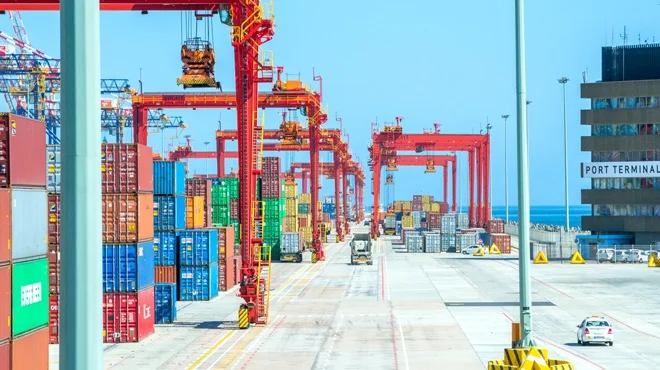Transnet is currently under significant scrutiny due to the recent Container Port Performance Index (CPPI) which ranked South Africa’s ports among the lowest of 405 evaluated worldwide. The challenges faced by the country’s ports have been further exacerbated by inclement weather conditions, impacting their operational efficiency. The latest Cargo Movement Update (CMU), prepared by Business Unity South Africa and the South African Association of Freight Forwarders, highlighted a significant week-on-week decline in container handling capacity, dropping from 8,244 to 5,737 containers daily. This 30.3% decrease in throughput capacity is attributed primarily to extreme weather conditions and equipment breakdowns, which have severely disrupted port operations.
The Port of Durban, one of the major ports in South Africa, experienced closures to incoming traffic due to adverse weather conditions. Additionally, the Eastern Cape ports faced operational challenges due to strong winds and vessel ranging, further impacting the overall efficiency of port operations. These disruptions come at a time when the global sea freight industry is grappling with intensified capacity shortages. The container shipping market has been particularly affected, with notable issues such as Maersk ceasing operations of a trans-Pacific service just eight weeks after its commencement, and nearly 50% of westbound Asia-Europe sailings failing to meet their scheduled departure times due to ongoing port congestion in Southeast Asian hubs.
Amid these capacity challenges, global freight rates have continued to rise for the ninth consecutive week, with a 13% increase recorded last week. Since the end of March, the Shanghai Containerized Freight Index has seen a 76% increase, with no signs of decline in the near future. The containership charter market also remains strong, with rates increasing by 10% last week, further compounding the challenges faced by the global supply chain sector.
In response to these manifold challenges, public sector ocean freight executives in South Africa and beyond have criticized the World Bank’s latest CPPI. Locally, a logistics principal who requested anonymity suggested that the CPPI does not provide a fair comparison, as it lumps together ports with vastly different sizes and service-related dynamics. This critique raises questions about the validity and accuracy of the World Bank’s data metrics, especially given the institution’s disclaimer that it cannot guarantee the accuracy of its research.
The criticism highlights a broader issue within the global port performance assessment framework. The varying conditions and operational contexts of different ports make it difficult to create a standardized measure that accurately reflects the performance and efficiency of each port. This disparity is evident in the case of South African ports, which are facing unique challenges that are not necessarily comparable to those faced by ports in other regions.
The current situation underscores the need for more nuanced and context-specific evaluations of port performance. While the CPPI provides a useful benchmark, it should be complemented with other assessments that take into account the specific conditions and challenges faced by individual ports. This approach would provide a more accurate and comprehensive understanding of port performance, helping to identify areas for improvement and inform targeted interventions.
The current CPPI ranking has highlighted the serious difficulties that South African ports confront, which are made worse by bad weather and equipment failures. Complicating matters further are the wider problems plaguing the global maritime freight business, such as declining capacity and growing freight rates? The necessity for more complex evaluations that take into account the distinctive circumstances of various ports is brought up by criticisms of the CPPI’s methodology. To guarantee effective and reliable port operations, addressing these issues would call for a coordinated effort from all supply chain sector players.



